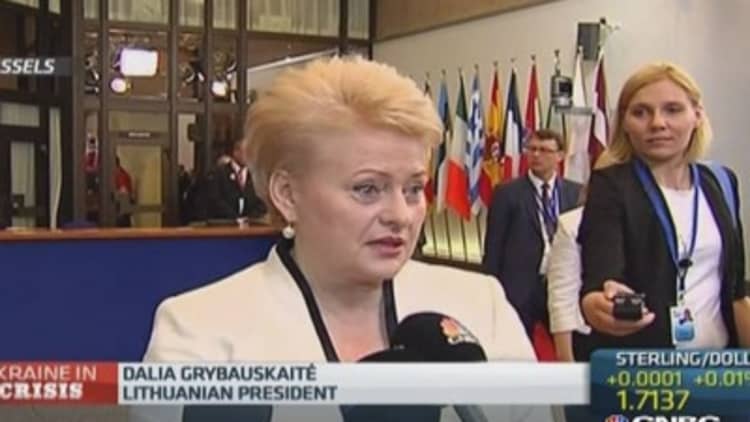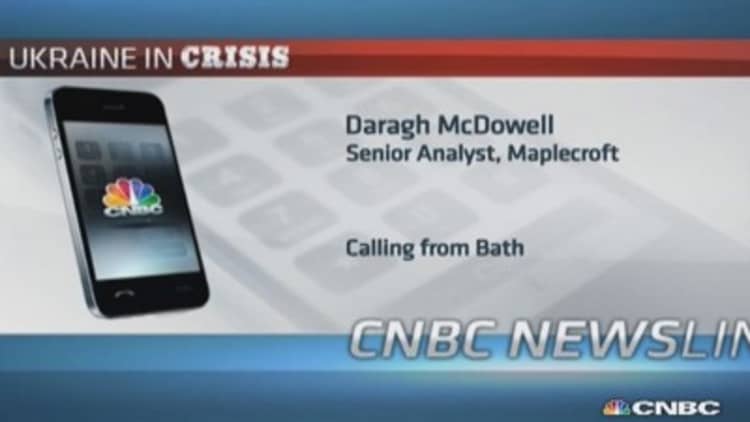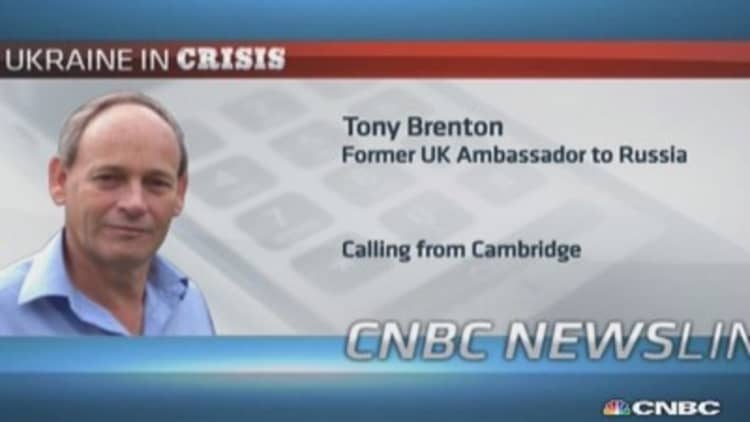
Russian stock markets were sharply lower on Thursday morning following the announcement of new sanctions by the U.S and the European Union, and analysts warned that tougher penalties were expected in the coming months.
U.S. President Barack Obama announced the fresh sanctions on Wednesday evening, amid fears that tensions between pro-Russian separatists and Ukraine's military could escalate further following the annexation of Crimea by Russia back in March.
The package was the most wide-ranging round of penalties so far, with Russia's state oil producer Rosneft hit. Other energy, financial and defense firms were also targeted, including Vnesheconombank, Gazprombank, gas producer Novatek and weapons maker Kalashnikov Concern.
Read the full list of sanctions on the Treasury website
Lending to these companies has now been prohibited in the U.S., meaning they will lack access to the country's debt markets. This builds on the financial and travel limits imposed earlier in the year.
Russian President Vladimir Putin responded to the most recent sanctions, saying that relations between the U.S. and Russia were in danger of reaching a "dead end" and could damage U.S. business interests in his country, according to reports.
On Thursday morning, Reuters reported that the Russian Foreign Ministry said it would not tolerate "U.S. sanction blackmail" and reserved the right to retaliate.
Russia's MICEX slipped 2.75 percent in mid-morning trade on Thursday, with shares of Rosneft tanking 6 percent, before paring some losses. The Russian ruble also fell below a one-month low against the dollar, trading at 34.98, as investors pulled money from the country.
Read MoreObama Widens Sanctions Against Russia
Timothy Ash, head of emerging markets at Standard Bank, said investors were anticipating yet more sanctions, and were likely to dump Russian assets, rather than be caught with sanctioned assets on their balance sheets further down the line.
"Investors will be asking which Russian companies will be next and what assets and financing will be subject to further sanctions," he said in a morning research note. "If you are subsequently caught up in further U.S. sanctions actions against Russia, it is clearly your own fault."
The U.S.'s clear message to Moscow also has ramifications for Europe, with any companies with business interests in the U.S. forced to comply.
In Brussels on Wednesday, European leaders unveiled their own measures, although these failed to match those of the U.S., focusing instead on blocking loans to Russia from the European Investment Bank and the European Bank for Reconstruction and Development.
Read MoreOp-Ed: Beware the risk of severe sanctions on Russia

Policymakers from the region weren't as lenient with their rhetoric, however.
Dalia Grybauskaite, the president of Lithuania, told CNBC the sanctions were necessary because, otherwise, the country would continue to behave aggressively. Swedish Prime Minister John Fredrik Reinfeldt added that the sanctions were crucial to prevent the problems escalating, and said the Swedish government was backing Level 3 sanctions, which would hit entire sectors of Russia's economy.
Read MorePutin: Russia looks East, will respect Ukraine poll
But not everyone agrees that tougher sanctions are a good move. Former British Ambassador to Russia, Tony Brenton said the sanctions were "fundamentally mis-thought out".
"Looking at the situation from the Moscow point of view, while sanctions are undoubtedly doing some economic damage, and no doubt they will do more, they are simply strengthening Putin's political position domestically - they are simply strengthening Putin's determination to get what he will see as the right result in the Ukraine," he told CNBC.
"They (the sanctions) are not going to achieve the result they intended to achieve, and they are simply accentuating antagonism between Russia and the West," he added.

Tougher sanctions?
Eurasia Group, a political risk consultancy firm, warned that an escalation of violence in eastern Ukraine was imminent, and higher-level sanctions would likely be imposed in the Fall. Ukrainian President Petro Poroshenko is under pressure from nationalist groups and military officials to continue the offensive against Pro-Russian militants, who are currently positioned in the eastern Ukraine cities of Donetsk and Luhansk.
Read MoreUS sanctions will take relations to dead end: Putin
"Violence is set to escalate...as fighting moves to larger population centers, casualties - including civilians - could increase significantly," Eurasia Group analysts, led by Alex Brideau, said in a note on Thursday.
Fresh sanctions were aimed at preventing Moscow from intervening in the Ukrainian military's on-going offensive, they added. However, Eurasia Group said it was hard to quantify how much Moscow was connected with the pro-Russian separatists that Ukraine is trying to quell.
"Recent press reports suggest Russia is cutting support for the militants. But while the precise nature and extent of Russian aid is difficult to assess, sources in eastern Ukraine indicate that significant cross-border aid to the militants continues," Brideau added.



